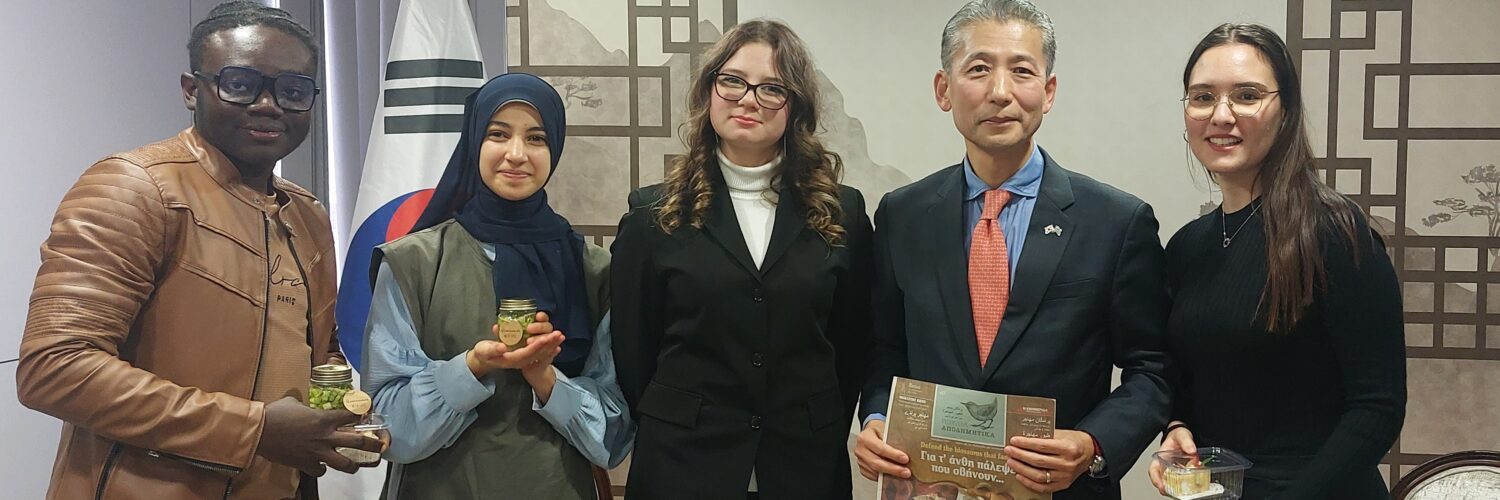From Greece to South Korea, children’s rights know no borders or discrimination. What steps has South Korea taken to integrate and defend children’s rights in its country? How has the spread of Korean music and food affected the world’s opinion on South Korea? Through our interesting discussion with South Korean Ambassador Ju-seong Lim, we learn the answers to these important questions.
Why did you decide to pursue a career in diplomacy?
Originally, I was interested in working in international trade and wanted to join a trade company. But my mother encouraged me to become a diplomat to pursue similar goals and have a stable job. Believe it or not, it turns out it’s wise to listen to your mom!
Could you share some memorable experiences or lessons as a diplomat
During the conflict between Hezbollah and Israel in 2006, I was in Beirut. Almost every Korean family left, including my family. I stayed in a ten-story apartment building, all alone, with bombing happening daily. Usually the bombing was during nights and accurate, but one morning there were heavy bombings; at this time I told myself that if I was still alive, it meant I had important work ahead.
How do you think Korean culture like K-pop and Korean cuisine has influenced how people around the world see Korea?
When I started my career in 1996, people would say, “Good to meet someone from Korea!” Now, if I say I’m from Korea, people often tell me, “My daughter loves K-pop,” or “My family is crazy about Korean food!” Korean culture has become well-loved worldwide. As a diplomat from Korea it is a good opportunity to approach people who do not know me as they are open due to Korean culture.
Personally, I liked Squid games, because it reminded me of my young days, because in my village I played with my friends each game. Regarding Korean food, there is a series about food and that is exactly how we crave the food, not only Korean but food in general. This reflects our connection with food.
What is journalism like in Korea, and do people stay informed in different ways?
Journalists in Korea say that they are in crisis. Today, young people do not read newspapers, either the paper or the websites. They get information from YouTube, Instagram, and TikTok and especially boys also use Discord a lot. These platforms provide also news, but it is doubtable if this is called journalism and there is a concern about fake news in these platforms. I’m curious how you encourage students to read your newspaper Migratory Birds.
Is Korea taking action to promote children’s rights and raise awareness about these rights in North Korea?
Yes, we’re working to draw global attention to human rights in North Korea, especially for children, who are very vulnerable. For example, in North Korea, both boys and girls join the military service at age 16; boys for ten years, and girls for seven years. This goes against the Convention on the Rights of the Child, which protects children from such long-term military service and at this age.
Could you share a successful program or initiative that South Korea has launched to protect and support vulnerable children? Why was it successful?
The most important person for children’s rights in Korea is Mr. Bang Jung Hwan, a writer and activist. In 1921, he introduced respectful ways of addressing children. Before then, children were often spoken to in informal ways, but Mr. Bang believed children deserved respect and polite treatment.
In 1923, Korea celebrated Children’s Day for the first time, and we continue to celebrate it every May 5. Korea joined the UN Convention on the Rights of the Child in 1991, which inspired us to adopt international standards and think more deeply about children’s rights. One important issue we tackled was violence against children. In the past, physical discipline was widely accepted as part of upbringing, but in 2014, we introduced strict regulations to prevent violence. This step helped us better protect children’s rights.
In addition, Korea focuses on preventing sexual violence against children.
What measures does South Korea take to ensure children’s access to healthcare, to education and to combat child poverty?
Korea provides all children with healthcare, free meals in schools, and education through high school. We have public and private schools but even the private one receives state funding and are obliged to keep low tuition. We also have special schools, like math schools, foreign languages, science schools etc which are very competitive to enroll to universities and attract many students.
We are focusing more on safety for children, meaning avoiding accidents in the school zone. We have strict road safety laws around schools, including high fines of around 100 euros and a 60-day driving restriction for violators.
How does South Korea collaborate with international organizations to address issues like child mortality and child health globally?
After the Korean War in the 1950s, UNICEF offered critical support to Korean children, providing food, healthcare, and education. Now, Korea actively collaborates with UNICEF and many Korean staff members work within the organization. Many Korean celebrities are ambassadors of UNICEF. The NGO Save the Children and other Korean NGOs are also dedicated to supporting children worldwide.
How can South Korea encourage greater youth involvement in civic and community activities?
Students in middle and high school are also required to participate in community service, such as cleaning public spaces, assisting the elderly, or volunteering at libraries. They should have this service every semester for a specific number of hours, and it is also important for their enrollment in the university.
What role do you see for children’s voices in shaping policies related to climate change, education, and other pressing global issues?
Young climate activists like Greta Thunberg inspire us, and we see how student voices are influential in places like Germany. This hasn’t become as prominent in Korea yet, but we believe that if middle and high school students were to advocate for change, it would signal a serious issue that everyone should pay attention to.
There’s a growing call for youth to become more politically involved, although students in Korea have rigorous academic schedules, which can make it challenging.
What advice would you give to young professionals interested in diplomacy?
We’re entering a new world; international relations have changed, countries in 90s-00s dreamt of globalization and thinking of the EU model. However, nowadays countries look inwards and protect themselves. This is the time that the diplomats are necessary. We should keep an open mind, go back to basics, and remember to talk and connect with others, so it’s important to stay adaptable and thoughtful.
How can young people shape the future of international relations?
Young people should remind adults to think about the future, especially on issues like climate change, resources, and values like freedom and democracy. Your voices are essential in shaping the world you’ll live in.









Add comment